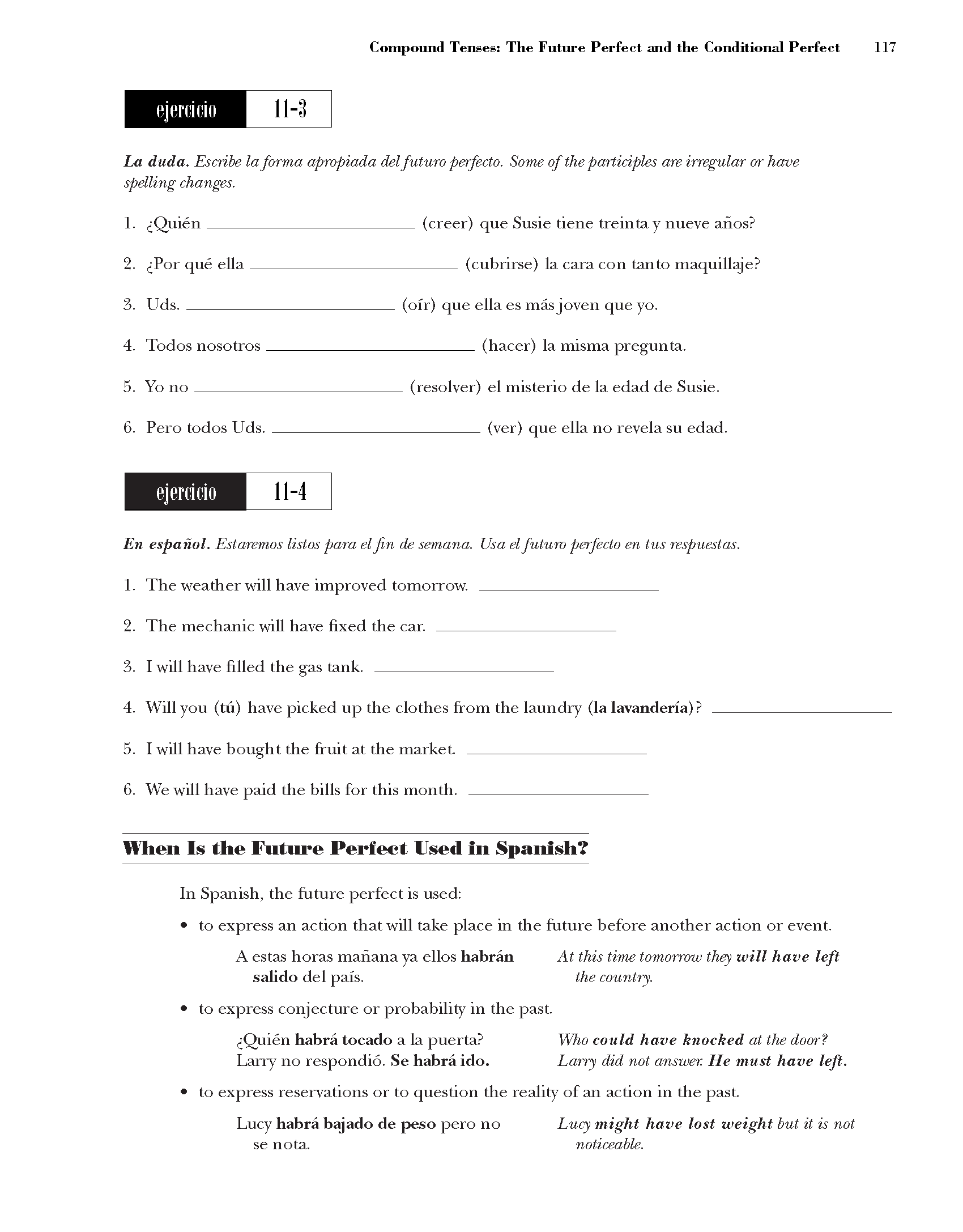CSG128

Compound Tenses: The Futurę Perfect and the Conditional Perfect
117
11-3
ejercicio
La duda. Escńbe la forma apropiada del futuro perfecto. Some of the participles are irregular or have spelling changes.
1. ^Quien_
2. ^Por que ella
3. Uds__
(creer) que Susie tiene treintay nueve ańos? _ (cubrirse) la cara eon tan to maquillaje?
4. Todos nosotros
5. Yo no_
(ofr) que ella es mas joven que yo. _ (hacer) la misma pregunta.
6. Pero todos Uds.
(resolver) el misterio de la edad de Susie. _ (ver) que ella no revela su edad.
ejercicio
En espańol. Estaremos listos para elfin de semana. Usa el futuro perfecto en tus respuestas.
1. The weather will have improved tomorrow. _
2. The mechanic will have fixed the car. _
3. I will have filled the gas tank. _
4. Willyou (tu) have picked up the clothes from the laundry (la lavandena) ? _
5. I will have bought the fruit at the market. _
6. We will have paid the bills for this month. _
Wlieii Is the Futurę Perfect Fsetl in Spanish?
In Spanish, the futurę perfect is used:
• to express an action that will take place in the futurę before another action or event.
A estas horas mańana ya ellos habran At this time tomorrow they will have left salido del pais. the country.
• to express conjecture or probability in the past.
^Quien habra tocado a la puerta? Wdio could have knocked at the door?
Larry no respondió. Se habra ido. Larry did not answer. He must have left.
• to express reservations or to question the reality of an action in the past.
Lucy habra bajado de peso pero no Lucy might have lost weight but it is not
se nota. noticeable.
Wyszukiwarka
Podobne podstrony:
CSG132 121 Compound Tenses: The Futurę Perfect and the Conditional Perfect 6. Habr
CSG134 123 Compound Tenses: The Futurę Perfect and the Conditional PerfectOne Morę Use of the Condit
CSG130 119 Compound Tenses: The Futurę Perfect and the Conditional Perfect people? Cyberspace might
CSG132 121 Compound Tenses: The Futurę Perfect and the Conditional Perfect 6. Habr
CSG132 121 Compound Tenses: The Futurę Perfect and the Conditional Perfect 6. Habr
CSG134 123 Compound Tenses: The Futurę Perfect and the Conditional PerfectOne Morę Use of the Condit
CSG134 123 Compound Tenses: The Futurę Perfect and the Conditional PerfectOne Morę Use of the Condit
CSG120 Compound Tenses: The Present Perfect and the Past Perfect 109Wlieii Is the Present Perfect Te
CSG116 Compound Tenses: The Present Perfect and the Past Perfect 105 yo he nosotros/n oso
CSG118 107 Compound Tenses: The Present Perfect and the Past Perfect • Irregular past participles in
więcej podobnych podstron